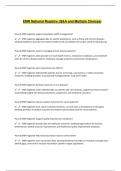EMR National Registry (Q&A and Multiple Choices)
How do EMR registries support population health management?
✔️✔️ EMR registries aggregate data on specific populations, such as those with chronic diseases,
allowing healthcare providers to monitor health trends and address the unique needs of these groups.
How do EMR registries assist in managing chronic disease patients?
✔️✔️ EMR registries allow providers to track health metrics, medication compliance, and treatment
plans for chronic disease patients, helping to manage symptoms and prevent complications.
How do EMR registries aid in preventive care efforts?
✔️✔️ EMR registries help identify patients due for screenings, vaccinations, or other preventive
measures, enabling providers to proactively manage patients' long-term health.
How do EMR registries facilitate research on rare diseases?
✔️✔️ EMR registries collect detailed data on patients with rare diseases, supporting clinical research
by providing insights into disease prevalence, progression, and treatment outcomes.
How do EMR registries improve patient outcomes for cancer patients?
✔️✔️ EMR registries track cancer treatment histories, survival rates, and responses to therapies,
allowing providers to analyze outcomes and improve personalized care for cancer patients.
How do EMR registries support quality improvement initiatives?
✔️✔️ EMR registries provide data on healthcare outcomes, enabling organizations to measure
performance, identify areas for improvement, and implement quality improvement initiatives.
How do EMR registries help track vaccination rates in communities?
✔️✔️ EMR registries store vaccination data, allowing healthcare providers to monitor coverage rates,
identify gaps, and work to increase vaccination uptake in target populations.
,How do EMR registries assist with early detection of disease outbreaks?
✔️✔️ EMR registries analyze patient data for patterns, enabling public health officials to detect
disease outbreaks early and implement timely interventions.
How do EMR registries support patient stratification for risk management?
✔️✔️ EMR registries classify patients based on risk factors, allowing providers to prioritize high-risk
patients for proactive interventions and targeted care.
How do EMR registries facilitate continuity of care across providers?
✔️✔️ EMR registries allow providers from different facilities to access a patient’s full health history,
promoting seamless transitions and continuity in patient care.
How do EMR registries assist in monitoring compliance with treatment guidelines?
✔️✔️ EMR registries track adherence to established treatment guidelines, helping providers ensure
consistency in care and adherence to evidence-based practices.
How do EMR registries contribute to reducing healthcare costs?
✔️✔️ EMR registries support preventive care, reduce hospital readmissions, and minimize redundant
tests, collectively leading to more efficient care and reduced healthcare costs.
How do EMR registries support tracking and managing patients with multiple comorbidities?
✔️✔️ EMR registries provide a comprehensive overview of patients with multiple conditions, enabling
providers to coordinate care and avoid conflicting treatments.
How do EMR registries improve patient engagement in self-care?
✔️✔️ EMR registries provide patients with access to their health data, empowering them to take an
active role in managing their health and adhering to treatment plans.
How do EMR registries assist in public health reporting and surveillance?
, ✔️✔️ EMR registries compile population health data, enabling healthcare organizations to report
trends, track health metrics, and respond to public health challenges.
How do EMR registries aid in identifying gaps in healthcare access?
✔️✔️ EMR registries analyze data across demographics, helping healthcare providers identify
disparities in access and implement initiatives to improve healthcare equity.
How do EMR registries improve tracking of patient follow-up appointments?
✔️✔️ EMR registries alert providers about upcoming follow-ups, helping ensure that patients receive
timely post-treatment evaluations and ongoing care.
How do EMR registries support coordinated care for patients undergoing rehabilitation?
✔️✔️ EMR registries store data on patient progress, enabling providers involved in rehabilitation to
track improvements and adjust therapy plans accordingly.
How do EMR registries help healthcare providers monitor mental health trends?
✔️✔️ EMR registries collect data on mental health diagnoses, treatments, and outcomes, allowing
providers to monitor trends and address emerging mental health needs in populations.
How do EMR registries facilitate genomic research and personalized medicine?
✔️✔️ EMR registries store genetic information and health data, supporting research that tailors
treatments to individuals based on genetic profiles and personalized care plans.
How do EMR registries aid in tracking long-term treatment outcomes?
✔️✔️ EMR registries monitor treatment outcomes over extended periods, helping providers
understand the effectiveness of treatments and adjust protocols as necessary.
How do EMR registries support early intervention for high-risk pregnancies?
✔️✔️ EMR registries track health data for expectant mothers with risk factors, enabling providers to
implement early interventions and improve maternal and neonatal outcomes.




